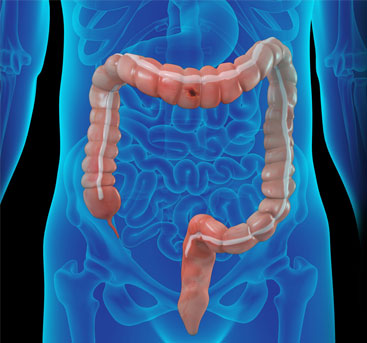What is Intestinal Perforation?
Intestinal perforation is a hole, cut or tear in the wall of the intestine allowing leakage of intestinal contents into the abdominal cavity. The leakage from the intestine may include bile juice, stomach acids, partially digested food and bacteria, which can all cause serious infection to the abdominal cavity, a condition called peritonitis.

Symptoms of Intestinal Perforation
The symptoms vary based on the underlying cause. The symptoms can include:
- Abdominal pain
- Nausea and vomiting
- Bloating and abdominal cramping
- Fever and chills
- Fatigue
- Rectal bleeding
The symptoms of peritonitis can include dizziness, shortness of breath, decreased stool or urine output, and increased heart rate.
Causes of Intestinal Perforation
The intestinal wall is made up of layers of smooth muscle tissue lined by mucous membranes and is prone to perforations. A surgical procedure of the intestine or diagnostic procedure such as a colonoscopy can increase the risk of intestinal perforation. Women are at higher risk than men.
An intestinal perforation may occur due to various causes, including:
- Inflammatory bowel disease (Crohn’s disease)
- Knife or gunshot wound
- Colon cancer
- Bowel obstruction
- Ischemic bowel disease (blood flow and tissue oxygenation is restricted)
- Ingestion of a sharp foreign body
Diagnosis
Your doctor will ask for your symptoms and perform a physical examination. He/she will order imaging studies such as an X-ray, CT-scan, ultrasound or MRI to diagnose the leakage of intestinal content. Specific blood tests may be ordered to check for infections or anemia (low iron in the blood).
Complications of Intestinal Perforation
If left untreated, intestinal perforations may cause life-threatening infections, bleeding, abscesses or death of bowel tissue.
Treatment of Intestinal Perforation
The treatment depends on the size of the perforation. Small perforations may sometimes heal themselves. Large perforations can require immediate surgical closure. Your surgeon usually prefers bowel resection (cutting out a portion) and reconnecting the cut ends. The goals of the surgery are to close the perforation and clear the foreign material that is leaking into the abdominal cavity.
Preparing for Surgery
You should inform your doctor about any medicines you are taking, and those which you should stop taking prior to the procedure. Inform your doctor if you are allergic to any medicines or anesthesia. You must avoid solid foods at least 6-8 hours before the surgery. Cleansing of your bowel will be performed with an antiseptic solution.
Surgical Procedure
The surgery may be performed as an open surgery or laparoscopic surgery depending on the size of the perforation and various other symptoms. The surgery includes the following steps:
- The surgery is performed under general anesthesia. You will lie on your back (supine position).
- Laparoscopic surgery involves a small incision in the abdomen. A laparoscope is a thin fiber-optic device fitted with a camera and lens. Images from the camera are transmitted to a large monitor for your doctor to view the inside of the intestine. Open surgery requires a larger incision.
- The perforated part is identified and isolated by clamping.
- Special surgical instruments are used to remove the perforated part of your intestine.
- The cut ends are joined together and sutured. The incision is closed and bandaged.
- You may need to stay at the hospital for 2-4 days.
Recovery after the Surgery
Antibiotics are prescribed to manage infection as well as medications to manage any pain. You will usually be on a liquid diet following the surgery. You will be advised to eat a low-fiber diet for a month and then advanced to regular meals. You should avoid lifting anything heavy for a few weeks.





